
Separations
Scope & Guideline
Connecting Researchers to the Future of Separation Science
Introduction
Aims and Scopes
- Development of Separation Techniques:
The journal covers various innovative separation techniques including liquid chromatography, gas chromatography, and solid-phase extraction, highlighting advancements that improve efficiency and effectiveness in diverse applications. - Environmental Applications:
Research focused on separation processes aimed at environmental remediation, including the removal of contaminants from water and soil, is a significant area of interest, reflecting the journal's commitment to sustainability. - Biological and Pharmaceutical Applications:
The journal features studies on the extraction and analysis of bioactive compounds from natural products, pharmaceuticals, and food matrices, contributing to advancements in drug development and nutraceutical research. - Methodological Innovations:
A consistent emphasis on methodological innovations, including the application of deep eutectic solvents, green extraction techniques, and advanced chromatographic methods, showcases the journal's role in promoting environmentally friendly practices. - Characterization and Analysis:
The journal publishes research that involves the characterization and quantification of compounds using various analytical techniques, thereby enhancing the understanding of complex mixtures and their properties.
Trending and Emerging
- Green Extraction Techniques:
There is an increasing emphasis on green extraction methods, such as the use of deep eutectic solvents and supercritical fluids, which align with global sustainability goals and environmental protection. - Advanced Chromatographic Methods:
The development of advanced chromatographic techniques, including ultra-high-performance liquid chromatography (UHPLC) and capillary electrophoresis, is trending, providing higher resolution and faster analysis times. - Integration of Machine Learning and AI:
The integration of machine learning and artificial intelligence in data analysis and optimization of separation processes is gaining popularity, reflecting the trend towards automation and precision in analytical chemistry. - Biotechnological Applications:
Emerging research focuses on biotechnological applications of separation science, particularly in the extraction of bioactive compounds from natural sources and their implications for health and nutrition. - Characterization of Complex Mixtures:
There is a growing interest in the characterization of complex mixtures from food, environmental, and biological samples, highlighting the need for sophisticated analytical techniques to understand their composition and interactions.
Declining or Waning
- Traditional Solvent Extraction Methods:
With the rise of green chemistry and sustainable practices, traditional solvent extraction methods are being overshadowed by more environmentally friendly alternatives, leading to a decline in publications focused on these techniques. - Chemical Analysis of Conventional Samples:
As the field evolves, there is a noticeable decrease in studies focused solely on conventional chemical analyses, indicating a shift towards more complex and multifaceted approaches to separation and analysis. - Studies on Low-Value Agricultural Waste:
Research specifically targeting the extraction from low-value agricultural waste has diminished, as focus shifts towards high-value applications and more economically viable sources for bioactive compounds. - Non-Targeted Screening of Environmental Contaminants:
While still relevant, the frequency of studies utilizing non-targeted screening methods for environmental contaminants appears to be waning, possibly due to the increasing complexity and cost associated with such methodologies.
Similar Journals

JOURNAL OF ANALYTICAL CHEMISTRY
Exploring New Dimensions in Analytical MethodologiesJOURNAL OF ANALYTICAL CHEMISTRY, published by PLEIADES PUBLISHING INC, stands as a pivotal resource in the field of analytical chemistry, offering an innovative platform for researchers, professionals, and students to advance their knowledge and contribute to the discourse within the discipline. With an ISSN of 1061-9348 and an E-ISSN of 1608-3199, this journal features a focused exploration of analytical methodologies, instrumentation developments, and applications across various domains, contributing to practical and theoretical advancements in the field. Currently ranked in the Q3 category in Analytical Chemistry with a Scopus rank of #111 out of 156, it provides critical insights and innovation strategies for professionals aiming to enhance their analytical capabilities. Access to the journal is through standard subscription models, and it covers an extensive range of topics pertinent to the discipline from 1996 to 2024. Engage with the JOURNAL OF ANALYTICAL CHEMISTRY to be part of a vibrant research community dedicated to push the boundaries of analytical practices.
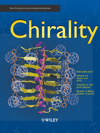
CHIRALITY
Innovating Insights into Chiral Compounds and BeyondCHIRALITY is a prominent journal in the field of chemistry, published by Wiley. Established in 1989, it has become a critical resource for researchers and professionals interested in the intricate study of chiral compounds across various applications, including analytical chemistry, catalysis, drug discovery, organic chemistry, pharmacology, and spectroscopy. With an ISSN of 0899-0042 and an E-ISSN of 1520-636X, CHIRALITY currently holds a Q2 ranking in Analytical Chemistry and Q3 rankings in several other categories based on the latest assessments. Although it does not offer open access, the journal is widely recognized for disseminating high-quality research that contributes significantly to our understanding of chirality. Its impact is reflected in its Scopus rankings, indicating the journal's influence and relevance within the broader scientific community. Researchers, students, and professionals alike will find CHIRALITY an invaluable conduit for cutting-edge findings and developments in chirality-related research.
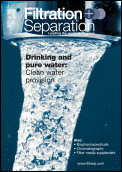
Filtration + Separation
Pioneering Insights in Filtration and Separation ScienceFiltration + Separation is a distinguished journal published by MA HEALTHCARE LTD, specializing in the fields of filtration technology, separation processes, and their applications within environmental science and industrial engineering. With a commitment to advancing knowledge in these critical areas, this journal, established in 1970, has consistently provided a platform for innovative research and developments, catering to the unique challenges of the filtration and separation industry. Despite its recent categorization in the Q4 quartile across various fields, including Environmental Science and Industrial Engineering, it remains pivotal for researchers and professionals seeking to stay abreast of emerging trends and technologies. The journal is accessible through traditional subscription models and aims to bridge the gap between academic research and practical applications. As the industry evolves, Filtration + Separation continues to serve as an invaluable resource for both seasoned experts and budding scholars passionate about enhancing separation processes and environmental sustainability.
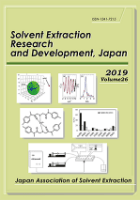
SOLVENT EXTRACTION RESEARCH AND DEVELOPMENT-JAPAN
Unlocking the potential of solvent extraction for all.SOLVENT EXTRACTION RESEARCH AND DEVELOPMENT-JAPAN is a prominent journal dedicated to advancing the field of solvent extraction and its applications in chemical engineering and general chemistry. Published by the Japan Association for Solvent Extraction, this journal plays a crucial role in disseminating innovative research findings, technical advancements, and comprehensive reviews pertinent to solvent extraction processes and technologies. With a publication history dating back to 1996 and extending through 2024, it serves as a vital resource for academics, industry professionals, and students alike. Although it currently does not offer open access, the journal provides invaluable insights into solvent extraction which can enhance both theoretical knowledge and practical applications in various industries. Its Scopus rankings indicate a competitive presence in the field, making it an essential read for anyone engaged in chemical engineering research. The journal is accessible via its office located at Professor Kenichi Akiba's residence at the University of Kitakyushu, and it invites contributions from researchers aiming to elevate the understanding and efficiency of solvent-based methodologies in chemical processes.
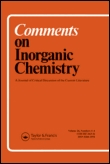
COMMENTS ON INORGANIC CHEMISTRY
Pioneering Discussions in Inorganic ChemistryCOMMENTS ON INORGANIC CHEMISTRY is a prestigious academic journal published by Taylor & Francis Ltd, specializing in the dynamic field of inorganic chemistry. With an impressive impact factor placing it in the Q1 category, this journal ranks #6 out of 79 in its field, reflecting its high influence and contribution to the discipline, with a remarkable percentile ranking of 93rd. Since its inception in 1981 and spanning publications until 2024, this journal serves as a crucial platform for researchers, professionals, and students to disseminate groundbreaking findings, review articles, and discussions on contemporary topics in inorganic chemistry. Although it is not an Open Access journal, the rigorous peer-review process ensures the publication of high-quality research. By bridging theoretical and practical aspects of inorganic chemistry, COMMENTS ON INORGANIC CHEMISTRY remains an essential resource for advancing knowledge and fostering innovation within the scientific community.

Analytical and Bioanalytical Chemistry Research
Enhancing Understanding through Open Access Chemistry.Analytical and Bioanalytical Chemistry Research is an esteemed open-access journal published by the Iranian Chemical Society, dedicated to the advancement of knowledge in the fields of analytical chemistry, biochemistry, and spectroscopy. Since its inception in 2014, this journal has provided a platform for researchers, professionals, and students to publish and access high-quality research articles that contribute to the understanding of chemical analysis and bioanalytical methods. With an ISSN of 2383-093X and an open-access model that promotes global dissemination of findings, it ensures that innovative research reaches a broad audience. The journal has consolidated its presence in the scientific community, currently ranked in quartile Q4 for analytical chemistry, biochemistry, and spectroscopy as of 2023. Its Scopus rankings, including a percentile of 34th in Analytical Chemistry, reflect its commitment to quality research and scholarly contribution. Situated in Tehran, Iran, the journal serves as a vital resource for academic discourse, offering insights into emerging trends and methodologies in analytical and bioanalytical chemistry.
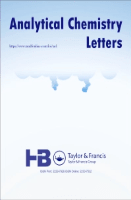
Analytical Chemistry Letters
Pioneering Methodologies for Real-World ApplicationsAnalytical Chemistry Letters is a notable journal published by Taylor & Francis Ltd, focusing on the interdisciplinary aspects of analytical chemistry and its applications across various fields, including materials science and forensic medicine. With an ISSN of 2229-7928 and an E-ISSN of 2230-7532, this journal provides researchers and professionals a platform to share their findings from 2011 to 2024, fostering advancements in methodologies and technologies. Despite being classified in the Q3 and Q4 category quartiles across multiple disciplines, the journal is crucial for emerging studies and discussions, particularly in the context of innovative analytical techniques and their relevance to real-world challenges. While currently not an open-access journal, its rigorous peer-review process ensures high-quality contributions that are essential for academics, professionals, and students keen on bridging theory and practice. The journal continues to build its reputation, reflected in its Scopus rankings which place it amidst a competitive landscape, encouraging growth and collaboration within the scientific community.

Acta Chemica Iasi
Advancing Chemistry Through Open Access InnovationActa Chemica Iasi is a distinguished open-access journal dedicated to advancing the field of chemistry, published by the esteemed ALEXANDRU IOAN CUZA UNIVERSITY PRESS located in Iasi, Romania. Since its inception, this journal has served as a vital platform for the dissemination of significant research findings, theoretical advancements, and methodological innovations in various chemistry disciplines. As an open-access publication since 2013, it provides unrestricted access to high-quality articles, fostering collaboration and knowledge sharing among researchers, professionals, and students globally. Although specific metrics such as H-Index and Scopus rankings may be forthcoming, the journal's commitment to rigor and excellence ensures that it remains an invaluable resource for those seeking to stay at the forefront of chemical research. With a focus on promoting scientific inquiry and innovation, Acta Chemica Iasi continues to uphold a legacy of scholarly excellence and contribution to the chemical sciences.
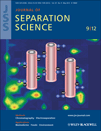
JOURNAL OF SEPARATION SCIENCE
Unleashing Knowledge in Analytical ExcellenceJOURNAL OF SEPARATION SCIENCE, published by WILEY-V C H VERLAG GMBH in Germany, is a premier platform dedicated to the advancement of knowledge in the fields of analytical chemistry and filtration and separation technologies. With an impact factor that reflects its strong influence—ranking #42 in Analytical Chemistry and #8 in Filtration and Separation—the journal strives to disseminate high-quality research findings from both academia and industry. The journal has established a significant readership, evidenced by its Scopus rankings, and is indexed under ISSN 1615-9306 and E-ISSN 1615-9314. As part of its commitment to accessibility, the journal provides open access options, enabling broader dissemination of innovative research. Since its convergence in 2000 and continuing through 2024, JOURNAL OF SEPARATION SCIENCE has become essential for researchers, professionals, and students aiming to stay at the forefront of separation science methodologies and applications, thereby actively influencing advancements in both theoretical knowledge and practical implementations.
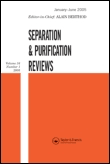
SEPARATION AND PURIFICATION REVIEWS
Fostering Collaboration for a Cleaner FutureSEPARATION AND PURIFICATION REVIEWS, published by Taylor & Francis Inc, stands as a leading journal in the fields of Analytical Chemistry and Filtration and Separation, consistently recognized for its high impact and scholarly contributions. With an impressive impact factor reflected in its Q1 and Q2 quartile rankings, this journal serves as an essential platform for researchers, professionals, and students seeking to advance their knowledge and understanding of innovative methodologies in separation science. Covering a broad scope from 1972 to 1995 and from 2003 to 2024, the journal features peer-reviewed articles that influence critical advancements in chemical engineering and analytical techniques. SEPARATION AND PURIFICATION REVIEWS not only fosters collaboration among academics but also encourages discussions surrounding current challenges and innovations in separation processes. With its commitment to providing open access options, this journal ensures that essential findings are readily available to a global audience, thus driving forward the frontiers of separation science.